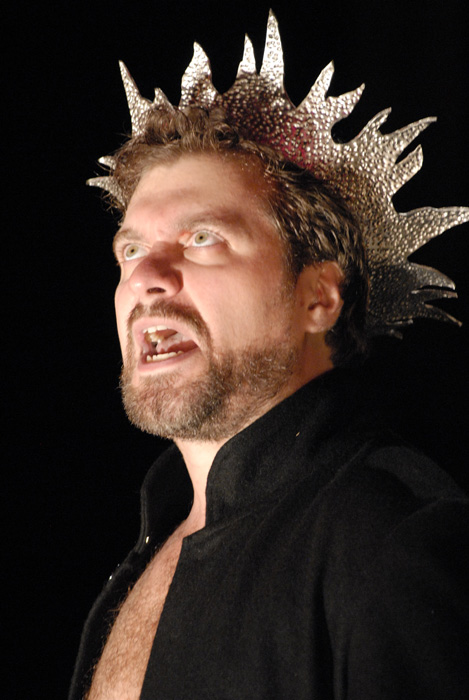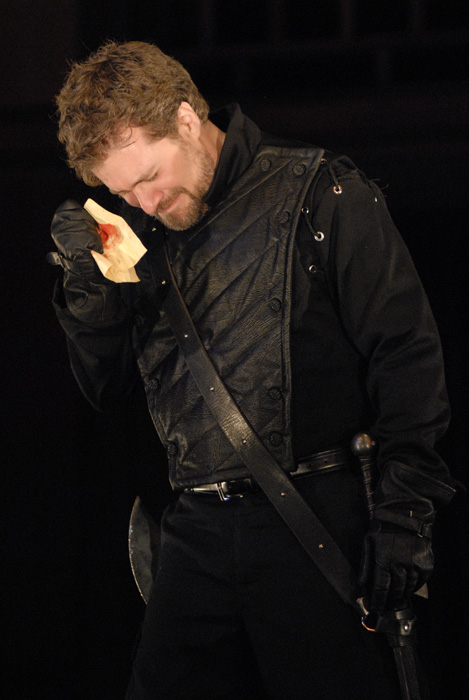 There are perhaps three uber-famous speeches in Macbeth, but the one that is most often quoted is the “Tomorrow, and tomorrow, and tomorrow” speech. It’s often taken as an existential lament, recited by actors and professors with a deep sorrowful intonation.
There are perhaps three uber-famous speeches in Macbeth, but the one that is most often quoted is the “Tomorrow, and tomorrow, and tomorrow” speech. It’s often taken as an existential lament, recited by actors and professors with a deep sorrowful intonation.
That’s not wrong, but it’s not right either. It loses any context. And, like my rather unusual take on the Capulet-Montague feud, I have an unorthodox idea about this speech. I saw the first hint at it in the summer of 2001, while playing the Thane of Ross at First Folio Shakespeare. That fall I played Mackers for them on tour, but didn’t follow through with my idea until I played the part for A Crew Of Patches in our first season, in the fall of 2003. Page Hearn, our director, allowed me to chase the notion, and I’ve made use of it ever since. For me, the actor, it works on many levels. And I hope that it makes sense for new viewers of the play, while at the same time challenging those familiar with the text.
Side note – I always like to flout audience expectations, even more when I can do so by returning to the text. So many of us are taught Shakespeare in such a poor way, that we have truly misformed notions of what we should be seeing and hearing. People expect R&J to be a dirge from the word go, Othello to be without humor, and Viola to look like a man (which loses the joke entirely!).
Anyway, a little context:
1) The first communication between Mac and his Lady is a letter – the letter, in fact, in which he tells her about the witches and their prophecy;
2) After the murder of Duncan, the Macs begin to drift apart. He kills the grooms without consulting her, and cuts her out of the murder of Banquo entirely. The process is solidified by the end of the banquet scene, after which they never speak together again. He can’t sleep and she is stuck in a dreamstate, sleepwalking and reliving the horror of the night of Duncan’s murder.
3) During the sleepwalking scene (“Out, out, damn spot!”), before Lady M enters, the Doctor and the Gentlewoman have this exchange:
Doctor
I have two nights watched with you, but can perceive
no truth in your report. When was it she last walked?
Gentlewoman
Since his majesty went into the field, I have seen
her rise from her bed, throw her night-gown upon
her, unlock her closet, take forth paper, fold it,
write upon’t, read it, afterwards seal it, and again
return to bed; yet all this while in a most fast sleep.
4) When Seaton enters to tell Mac that his wife is dead, Mac’s response is “She should have died hereafter; There would have been time for such a word.” (emphasis mine).
5) Within the speech itself, there seem to be two distinct parts, the first having multi-syllable words and soft consonants and vowel sounds, the second having mainly one syllable words full of plosive sounds– as though originating from two minds. The speech seems to be divided thus:
To-morrow, and to-morrow, and to-morrow,
Creeps in this petty pace from day to day
To the last syllable of recorded time,
And all our yesterdays have lighted fools
The way to dusty death.
Out, out, brief candle!
Life’s but a walking shadow, a poor player
That struts and frets his hour upon the stage
And then is heard no more: it is a tale
Told by an idiot, full of sound and fury,
Signifying nothing.
Bearing all that in mind, imagine this – Seaton enters after the blood-curdling cry offstage. The king says, “Wherefore was that cry?” In reply, Seaton holds out a blood-stained bit of paper with mad scribblings of writing all over it. The seal on it tells us that it is the same letter that Mac sent in the first scene, but it has been written over and over, in corners and on edges, until it is covered with words. Seaton says, “The queen, my lord, is dead.”
Macbeth takes the letter from Seaton and waves him off. Looking at the paper, he says, “She should have died hereafter; there would have been time for such a word.” Then, squinting, he begins to read, trying to make sense out of the squiggles and shapes written by a sleepwalker in despair.
It was my wife, Jan, who recognized the conversation between the gentlewoman and the doctor and brought to my attention that we had already heard that Lady Mac was frantically writing in her sleep. She also pointed out the change in style in the famous “Tomorrow” speech. Her analysis, found when she was playing Lady for the Patches, combined with my initial conception of the mirrored communication, made a strong case for the playing of one of Shakespeare’s most famous speeches as one part letter, one part realization.
Our thesis, then, in brief: The first half of “Tomorrow, and tomorrow” is Lady Macbeth’s suicide note.
We like this idea for two reasons. It mirrors their first communication in the play and it gives them a final moment of connection, allowing Mac to realize how far they’ve fallen, and how little is left to him. I originally liked the simple mirroring of first communication and last communication being a letter– and it helped me play the powerful soliloquay thrown into the center of such frenzied action at the end of the play. It was Jan who showed me how much textual sense it made, when combined with the “mad” scene, which isn’t a mad-scene at all – it’s a sleepwalking scene, where the Lady’s conscience forces her to re-enact nightly the events that haunt her (Jan points out that in the other famous “mad” scene – Ophelia in Hamlet – the madwoman spouts actual nonsense, gibberish. That is not the case here).
Since I have no intention of writing a Macbeth historical novel (it’s been done, several times, though Dorothy Dunnett’s THE KING HEREAFTER is the best, the most detailed, and the hardest), Jan and I thought we would lay this out here, sending it into the aether for other actors and directors to use or not, as they choose.
Have at.
Note: Although I posted this for theatre folk, I get a great many hits from students – hundreds a week. For you we ask, please attribute your papers something like this: “According to David Blixt, Shakespearean actor and author of THE MASTER OF VERONA,…” That way, if your teachers want to pick a fight, they can argue with me directly.


thank you for this thought. i shall be using the three “tomorrow’s” for an audition. for A Midsummer Night’s Dream of all things. i protrayed this soliloquy wordlessly as a young actor in acting class many years ago, and it went over very well. wish i could remember what i did. 🙂
This is excellent – I am a shakespeare lover and I am writing a paper on Macbeth and your idea that The first half of “Tomorrow, and tomorrow” is Lady Macbeth’s suicide note has really helped me get a unique angle for my paper.
I am not an actor but an english major but I can imagine that interpreting this passage as a suicide note would really alter the way this piece is performed and interpreted by the actor.